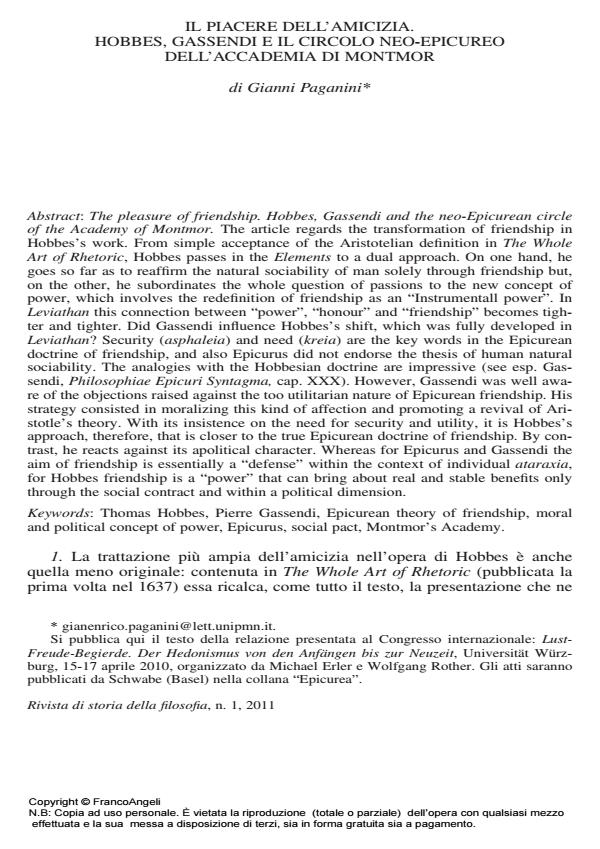The pleasure of friendship. Hobbes, Gassendi and the neo-Epicurean circle of the Academy of Montmor
Journal title RIVISTA DI STORIA DELLA FILOSOFIA
Author/s
Publishing Year 2011 Issue 2011/1
Language Italian Pages 16 P. 23-38 File size 785 KB
DOI 10.3280/SF2011-001002
DOI is like a bar code for intellectual property: to have more infomation
click here
Below, you can see the article first page
If you want to buy this article in PDF format, you can do it, following the instructions to buy download credits

FrancoAngeli is member of Publishers International Linking Association, Inc (PILA), a not-for-profit association which run the CrossRef service enabling links to and from online scholarly content.
The article regards the transformation of friendship in Hobbes’s work. From simple acceptance of the Aristotelian definition in The Whole Art of Rhetoric, Hobbes passes in the Elements to a dual approach. On one hand, he goes so far as to reaffirm the natural sociability of man solely through friendship but, on the other, he subordinates the whole question of passions to the new concept of power, which involves the redefinition of friendship as an "Instrumentall power". In Leviathan this connection between "power", "honour" and "friendship" becomes tighter and tighter. Did Gassendi influence Hobbes’s shift, which was fully developed in Leviathan? Security (asphaleia) and need (kreia) are the key words in the Epicurean doctrine of friendship, and also Epicurus did not endorse the thesis of human natural sociability. The analogies with the Hobbesian doctrine are impressive (see esp. Gassendi, Philosophiae Epicuri Syntagma, cap. XXX). However, Gassendi was well aware of the objections raised against the too utilitarian nature of Epicurean friendship. His strategy consisted in moralizing this kind of affection and promoting a revival of Aristotle’s theory. With its insistence on the need for security and utility, it is Hobbes’s approach, therefore, that is closer to the true Epicurean doctrine of friendship. By contrast, he reacts against its apolitical character. Whereas for Epicurus and Gassendi the aim of friendship is essentially a "defense" within the context of individual ataraxia, for Hobbes friendship is a "power" that can bring about real and stable benefits only through the social contract and within a political dimension.
Keywords: Thomas Hobbes, Pierre Gassendi, Epicurean theory of friendship, moral and political concept of power, Epicurus, social pact, Montmor’s Academy
, Il piacere dell'amicizia. Hobbes, Gassendi e il circolo neo-epicureo dell'Accademia di Montmor in "RIVISTA DI STORIA DELLA FILOSOFIA" 1/2011, pp 23-38, DOI: 10.3280/SF2011-001002